
Infrastructure and defense services provider Parsons (NYSE: PSN) announced better-than-expected revenue in Q3 CY2024, with sales up 27.6% year on year to $1.81 billion. The company’s full-year revenue guidance of $6.7 billion at the midpoint also came in 2.6% above analysts’ estimates. Its non-GAAP profit of $0.95 per share was also 20.8% above analysts’ consensus estimates.
Is now the time to buy Parsons? Find out by accessing our full research report, it’s free.
Parsons (PSN) Q3 CY2024 Highlights:
- Revenue: $1.81 billion vs analyst estimates of $1.64 billion (10.6% beat)
- Adjusted EPS: $0.95 vs analyst estimates of $0.79 (20.8% beat)
- EBITDA: $167 million vs analyst estimates of $145.1 million (15.1% beat)
- The company lifted its revenue guidance for the full year to $6.7 billion at the midpoint from $6.45 billion, a 3.9% increase
- EBITDA guidance for the full year is $605 million at the midpoint, above analyst estimates of $590.7 million
- Gross Margin (GAAP): 19.9%, in line with the same quarter last year
- Operating Margin: 6.4%, in line with the same quarter last year
- EBITDA Margin: 9.2%, in line with the same quarter last year
- Free Cash Flow Margin: 15.9%, up from 13.4% in the same quarter last year
- Backlog: $8.8 billion at quarter end, in line with the same quarter last year
- Market Capitalization: $11.15 billion
CEO Commentary“We delivered record third quarter results for total revenue, organic revenue growth, net income, adjusted EBITDA, operating cash flow, and contract awards. We also achieved over 20% organic growth for the sixth consecutive quarter, while efficiently managing the business as bottom line growth continues to outpace our strong top line growth,” said Carey Smith, chair, president, and chief executive officer.
Company Overview
Delivering aerospace technology during the Cold War-era, Parsons (NYSE: PSN) offers engineering, construction, and cybersecurity solutions for the infrastructure and defense sectors.
Defense Contractors
Defense contractors typically require technical expertise and government clearance. Companies in this sector can also enjoy long-term contracts with government bodies, leading to more predictable revenues. Combined, these factors create high barriers to entry and can lead to limited competition. Lately, geopolitical tensions–whether it be Russia’s invasion of Ukraine or China’s aggression towards Taiwan–highlight the need for defense spending. On the other hand, demand for these products can ebb and flow with defense budgets and even who is president, as different administrations can have vastly different ideas of how to allocate federal funds.
Sales Growth
Examining a company’s long-term performance can provide clues about its business quality. Any business can put up a good quarter or two, but the best consistently grow over the long haul. Over the last five years, Parsons grew its sales at an impressive 11.1% compounded annual growth rate. This is encouraging because it shows Parsons’s offerings resonate with customers, a helpful starting point.
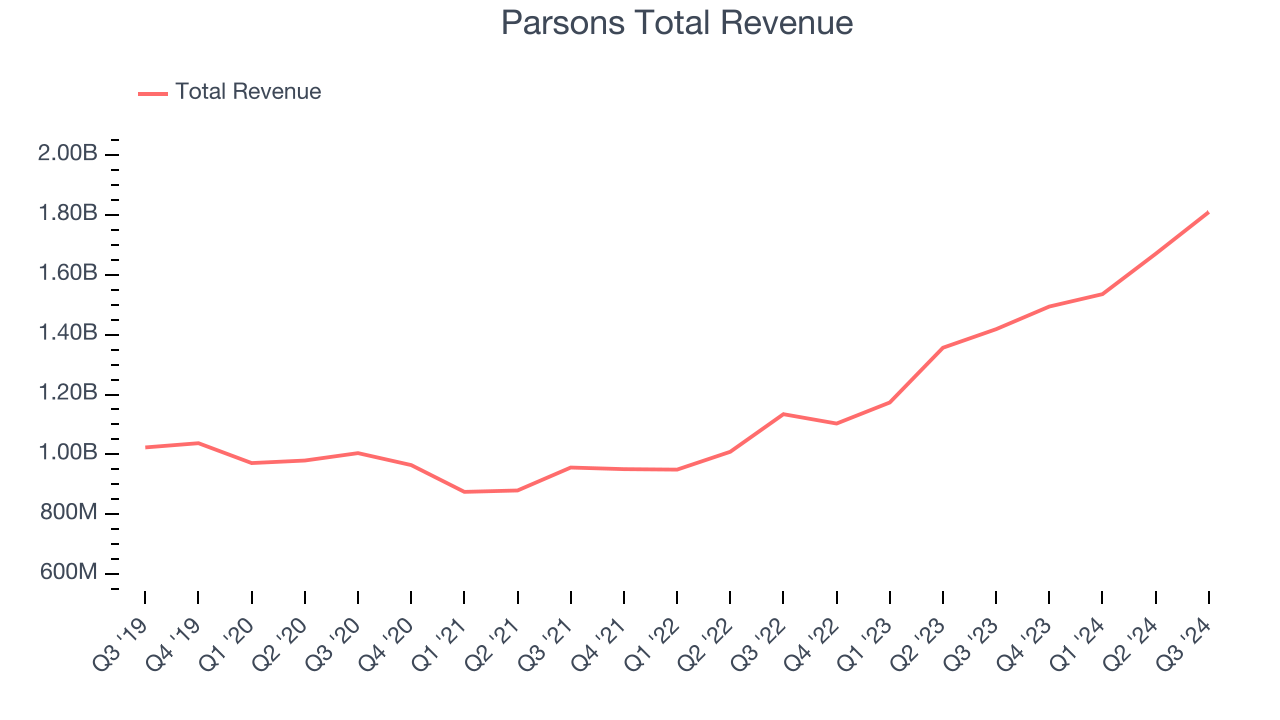
We at StockStory place the most emphasis on long-term growth, but within industrials, a half-decade historical view may miss cycles, industry trends, or a company capitalizing on catalysts such as a new contract win or a successful product line. Parsons’s annualized revenue growth of 26.9% over the last two years is above its five-year trend, suggesting its demand was strong and recently accelerated. 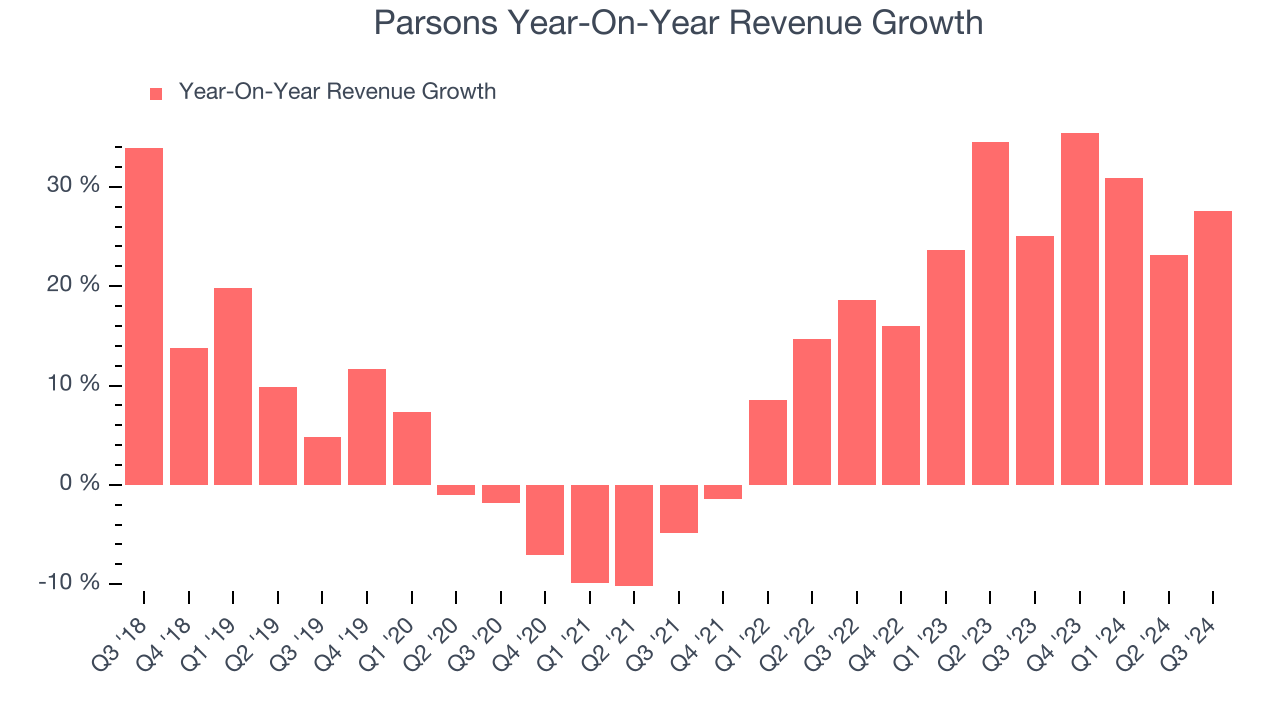
We can better understand the company’s revenue dynamics by analyzing its backlog, or the value of its outstanding orders that have not yet been executed or delivered. Parsons’s backlog reached $8.8 billion in the latest quarter and averaged 3.4% year-on-year growth over the last two years. Because this number is lower than its revenue growth, we can see the company fulfilled orders at a faster rate than it added new orders to the backlog. This implies Parsons was operating efficiently but raises questions about the health of its sales pipeline. 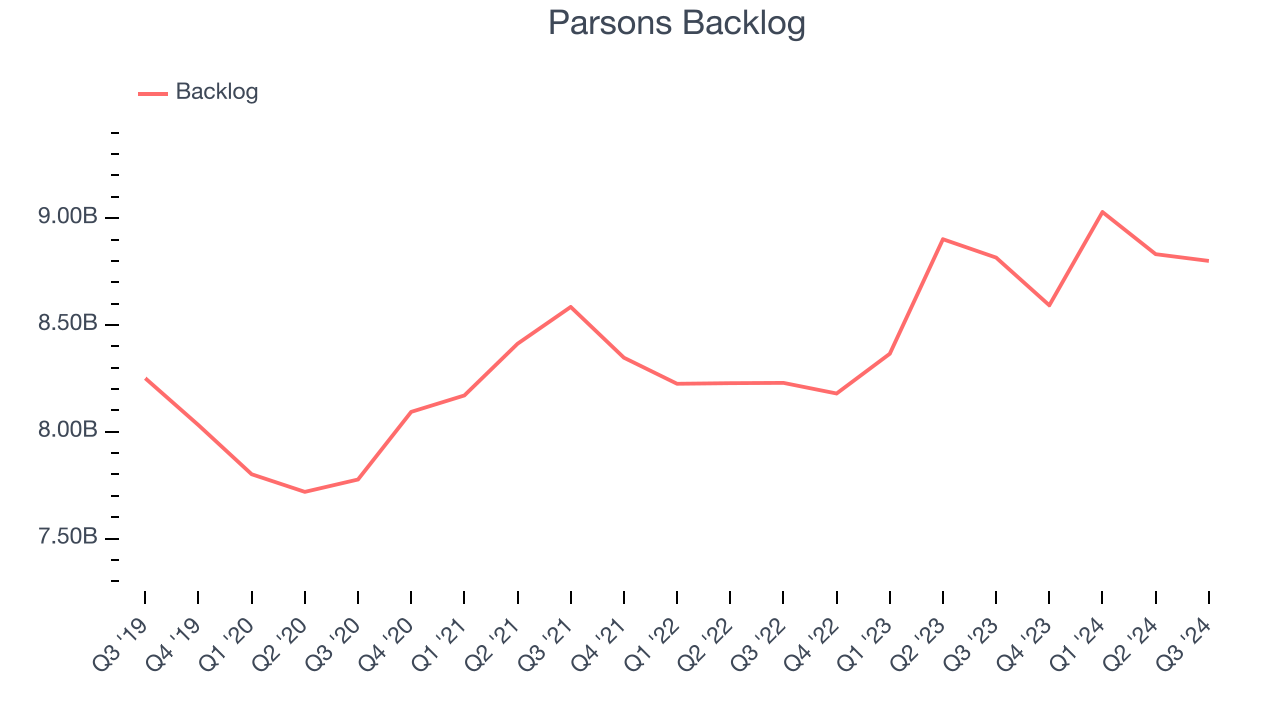
This quarter, Parsons reported robust year-on-year revenue growth of 27.6%, and its $1.81 billion of revenue topped Wall Street estimates by 10.6%.
Looking ahead, sell-side analysts expect revenue to grow 6.8% over the next 12 months, a deceleration versus the last two years. This projection is underwhelming and indicates the market believes its products and services will face some demand challenges. At least the company is tracking well in other measures of financial health.
Unless you’ve been living under a rock, it should be obvious by now that generative AI is going to have a huge impact on how large corporations do business. While Nvidia and AMD are trading close to all-time highs, we prefer a lesser-known (but still profitable) semiconductor stock benefitting from the rise of AI. Click here to access our free report on our favorite semiconductor growth story.
Operating Margin
Operating margin is an important measure of profitability as it shows the portion of revenue left after accounting for all core expenses–everything from the cost of goods sold to advertising and wages. It’s also useful for comparing profitability across companies with different levels of debt and tax rates because it excludes interest and taxes.
Parsons was profitable over the last five years but held back by its large cost base. Its average operating margin of 4.9% was weak for an industrials business.
On the bright side, Parsons’s annual operating margin rose by 2.2 percentage points over the last five years, as its sales growth gave it operating leverage.
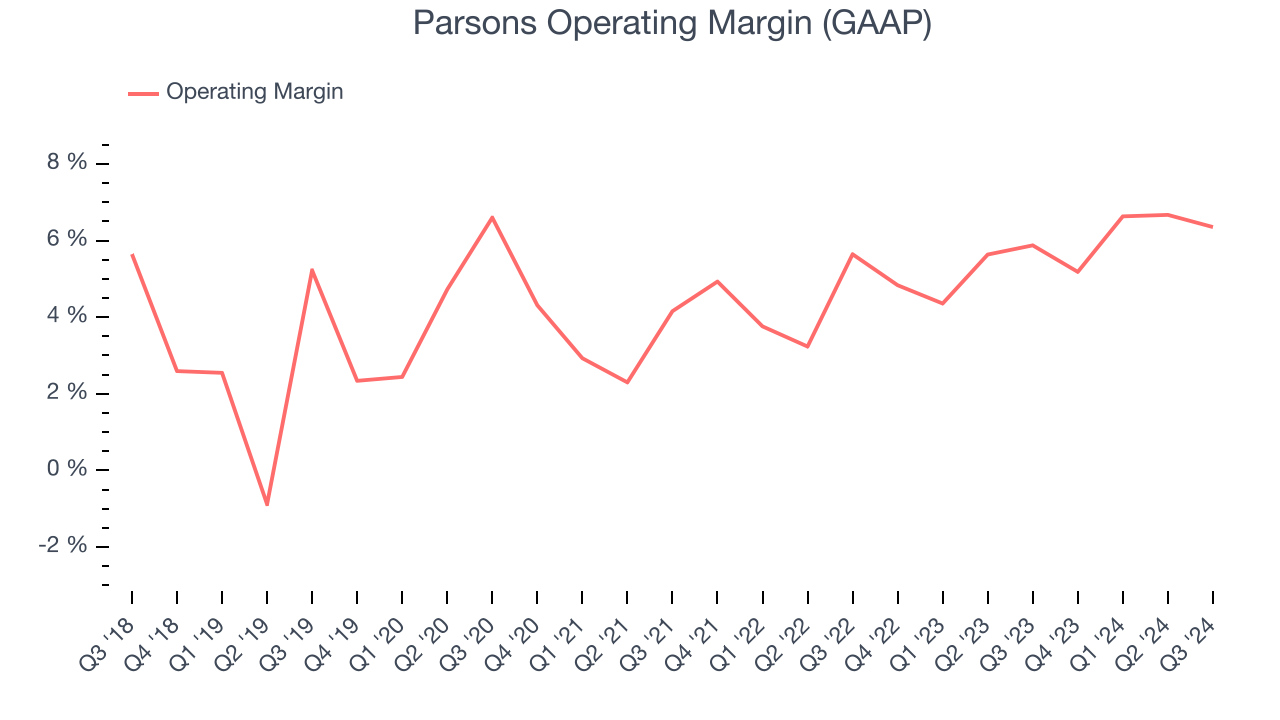
This quarter, Parsons generated an operating profit margin of 6.4%, in line with the same quarter last year. This indicates the company’s overall cost structure has been relatively stable.
Earnings Per Share
We track the long-term change in earnings per share (EPS) for the same reason as long-term revenue growth. Compared to revenue, however, EPS highlights whether a company’s growth was profitable.
Parsons’s EPS grew at a solid 9.9% compounded annual growth rate over the last five years. Despite its operating margin expansion during that time, this performance was lower than its 11.1% annualized revenue growth. This tells us that non-fundamental factors affected its ultimate earnings.
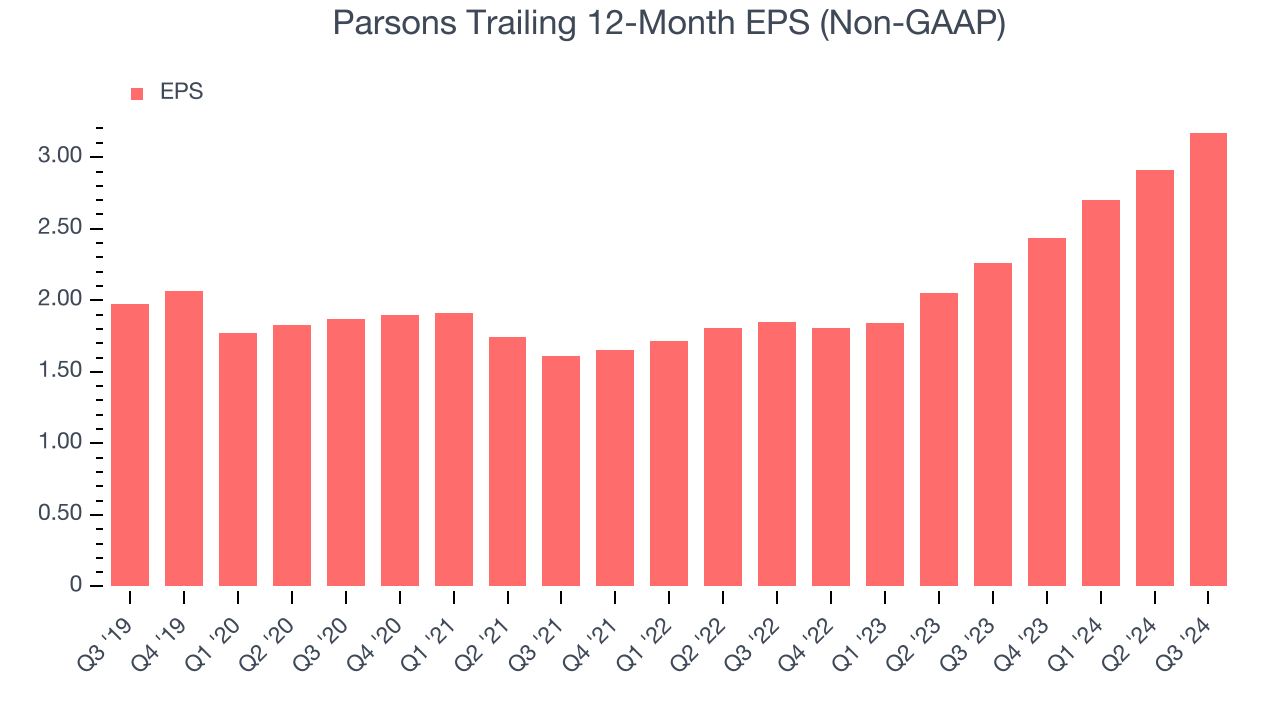
Diving into the nuances of Parsons’s earnings can give us a better understanding of its performance. A five-year view shows Parsons has diluted its shareholders, growing its share count by 11.7%. This dilution overshadowed its increased operating efficiency and has led to lower per share earnings. Taxes and interest expenses can also affect EPS but don’t tell us as much about a company’s fundamentals. 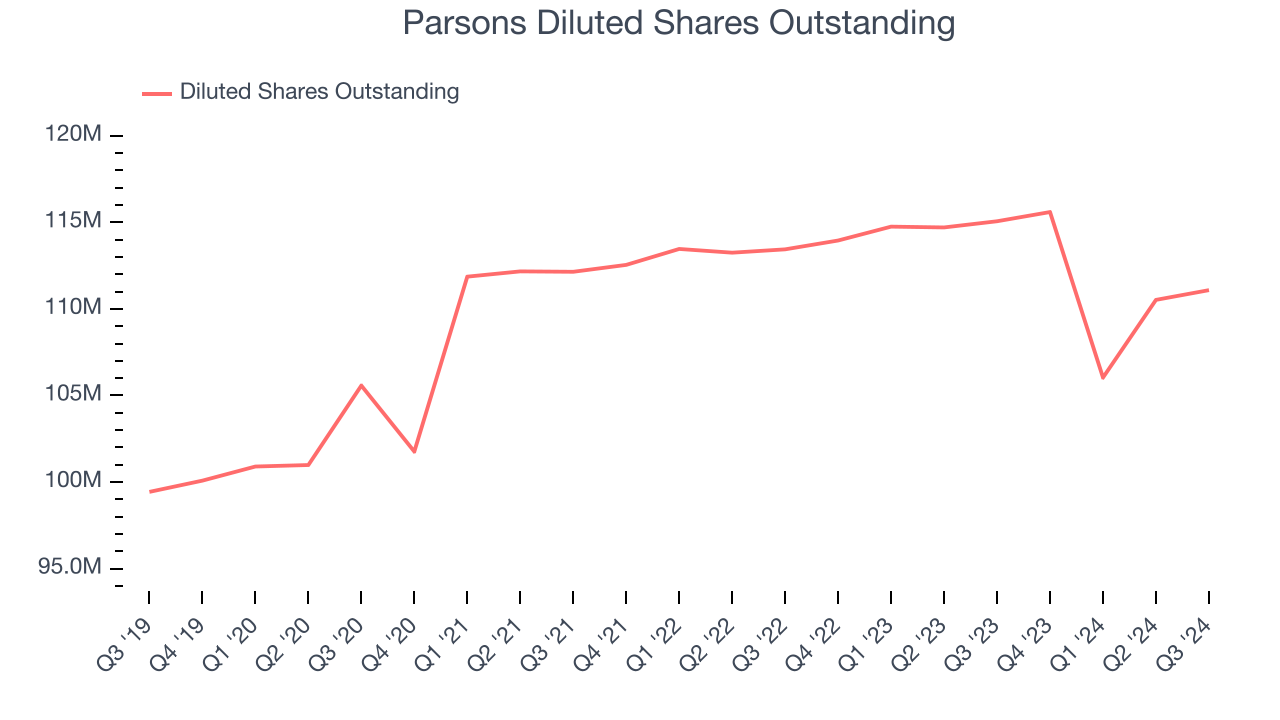
Like with revenue, we analyze EPS over a more recent period because it can give insight into an emerging theme or development for the business.
For Parsons, its two-year annual EPS growth of 31.1% was higher than its five-year trend. We love it when earnings growth accelerates, especially when it accelerates off an already high base.In Q3, Parsons reported EPS at $0.95, up from $0.69 in the same quarter last year. This print easily cleared analysts’ estimates, and shareholders should be content with the results. Over the next 12 months, Wall Street expects Parsons’s full-year EPS of $3.17 to grow by 8.5%.
Key Takeaways from Parsons’s Q3 Results
We were impressed by how significantly Parsons blew past analysts’ revenue and EBITDA expectations this quarter. We were also excited its full year revenue guidance was lifted along with its full year EBITDA guidance coming in above Wall Street’s estimates. On the other hand, its backlog missed. Zooming out, we think this quarter was quite good. The stock traded up 4.7% to $109.95 immediately following the results.
Sure, Parsons had a solid quarter, but if we look at the bigger picture, is this stock a buy?When making that decision, it’s important to consider its valuation, business qualities, as well as what has happened in the latest quarter. We cover that in our actionable full research report which you can read here, it’s free.




